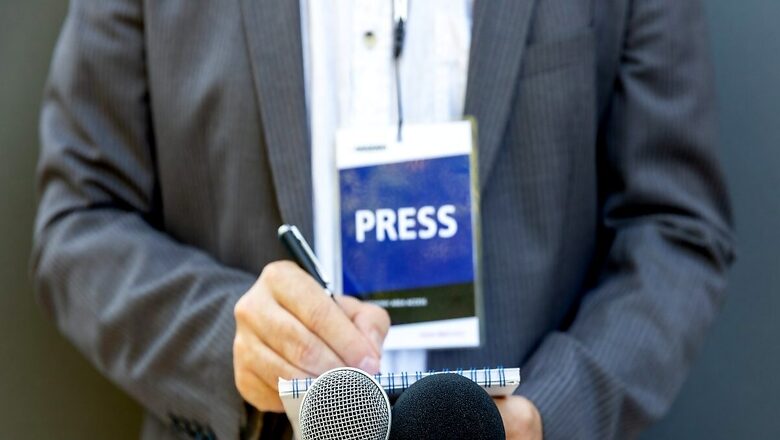
views
May 3, every year, is celebrated by the United Nations and UNESCO as ‘World Press Freedom Day’. It is premised on one basic truth: all our freedoms, in some form or the other, are dependent on media freedom. It is the foundation of democracy and justice. In India, Article 19 (i) of our Constitution makes freedom of speech and expression a fundamental right, which implies the freedom of the media. On the 30th anniversary of World Press Freedom Day, let’s make a balanced review of the extent of media freedom in our country.
One thing is clear: Indians, used to democracy for over seven decades, value press freedom. They also know the difference between government-sponsored propaganda, direct or indirect, and objective news. This is not a recent phenomenon. During 1975-77, when the Emergency was imposed, and the government mouthpiece—Doordarshan—only sang praises of the dictatorial government, ordinary people—even in rural areas—would tune in to the BBC radio to know what was actually happening.
All governments, irrespective of ideology, prefer a ‘cooperative’ or more pliant media that projects its priorities, endorses its policies, and keeps criticism to the minimum. I am personally aware of this, having worked as the Press Secretary to two Presidents of India, and as the Official Spokesperson of the Ministry of External Affairs (MEA).
There are several ways the government can achieve this objective: cultivating the media, influencing key opinion makers, and building cordial relations with corporates who own media outlets. But intimidation, coercion and punitive action against media platforms, including the withdrawal of advertisements, would be crossing the line in any democracy.
Has the government crossed this line? The answer is yes and no. No one can say that India does not have a free media. But it can’t be said that no attempt has been made to control the media. In the World Press Freedom Index 2023, prepared by Reporters Without Borders, an international NGO, India has been ranked 161 among the 180 countries surveyed. This is the lowest India has ever been ranked, although its position has been falling since 2017. Reporters Without Borders uses several key indices to make its rankings. These include the scope for media autonomy, political pressure from the state, the freedom to hold politicians and governments to account, and the safety of journalists, including professional harm and loss of one’s job.
International organisations do not always speak the gospel truth, and the government has rebutted this report. However, there have been some disquieting trends recently that cannot be ignored. The first is a generic attempt to conflate all criticism with being anti-national, or against national security. The Constitution does allow in Article 19 (2) the State to impose ‘reasonable restrictions’ to freedom of speech and expression in the interest of the sovereignty and integrity of India, the security of the State, public order, decency or morality, or in relation to defamation, contempt of court, or incitement to an offence.
However, in 2020, when the Malayalam channel Media One TV was blocked by the government, the Supreme Court (SC), while reversing the order, categorically said that the “criticism of government policy can, by no stretch of the imagination, be brought within any of the grounds stipulated in 19(2) of the Constitution.” In 2021, when sedition charges were slapped on the late journalist Vinod Dua, the SC quashed the FIR and came down heavily against arbitrary actions against the media for undisclosed national security considerations. Several other SC pronouncements stress that an independent press is vital for the robust functioning of a democratic republic. The press has the duty, the SC said, to speak truth to power, and the State cannot muzzle the media citing criticism of government policies and actions.
The government also displays, on occasions, much too thin a skin to criticism. Recently, a BBC documentary on the Gujarat riots was blocked by the government. It was a clumsy and entirely avoidable reaction. Because the documentary said nothing new, the case has been settled, and in the ordinary course, much fewer people would have watched it. But the ban whetted the curiosity of people and it went nearly viral on social media. The government’s apparent intolerance to criticism became even more evident when immediately after this, the BBC offices in India were investigated for tax evasion and fraud.
The government should also tread with caution in trying to regulate the internet and social media. In the case Shreya Singhal vs Union of India, the SC struck down Section 66 (A) of the Information Technology Act which gave arbitrary powers to the police to arrest people for social media posts which it considered ‘offensive’ or ‘menacing’. Now, the Ministry of Electronics and IT has notified amendments to the IT Act Rules 2021 which allows the Ministry to appoint a ‘fact check’ body which will identify ‘fake’ or ‘misleading’ content about the government on platforms like Facebook, YouTube and Twitter, as well as internet providers like Airtel, Jio and Vodafone Idea, and require them to take it down. The Editors Guild of India and the News Broadcaster’s Digital Association have protested these amendments stating that this will lead to “censorship of the press”, and will have “a chilling effect on the media.” The final decision is that social media platforms and internet services should make ‘reasonable efforts’ not to post fake or misleading information relating to the Central government, which still gives the government-appointed body excessive powers, according to media bodies.
It is important too that the media fulfill its dharma of defending press freedom. Reducing itself to a mouthpiece of the government makes a mockery of that sacred dharma. It is also a subversion of our democracy of which we are so proud.
The author is a former diplomat, an author and a politician. The views expressed in this article are those of the author and do not represent the stand of this publication.
Read all the Latest Opinions here




















Comments
0 comment